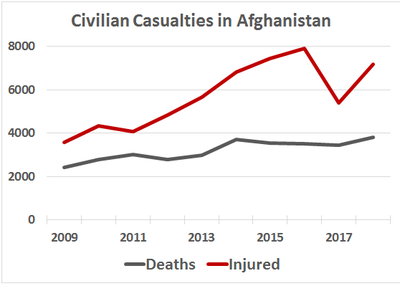Public Misled on Afghan War: Washington Post
Public Misled on Afghan War: Washington Post
Read the article from the Washington Post about documents criticizing progress in the US-led war in Afghanistan.
Read the documents and search via the tool at the end of the page. .
Craig Whitlock is an investigative reporter who specializes in national security issues. He has covered the Pentagon, served as the Berlin bureau chief and reported from more than 60 countries. He joined The Washington Post in 1998.

Progress? Some US officials suggest that civilian casualties is one benchmark for determining progress in the Afghanistan war – “If the number’s going up, you’re losing. If the number’s going down, you’re winning. It’s as simple as that,” suggested James Dobbins, former US diplomat, in 2009 (Source: UN Assistance Mission in Afghanistan)